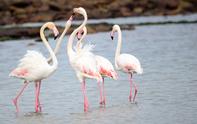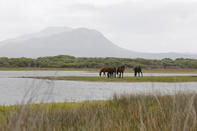Tranquility and Unspoilt Nature
Fisherhaven is a lesser-known small coastal village on the banks of the Bot River Lagoon, the entrance to which is often noticed by travellers on their way to Hermanus, 14 km away.

The simple, but distinct entrance is comprised of a neatly painted sign and a small garden of indigenous plants. The entrance is maintained by villagers and volunteers nearby.
The main drawing card of Fisherhaven is its superb tranquility and unspoilt nature. Many of the people you can expect to see there include European visitors skipping the harsh Northern Hemisphere winter, although the village is also home to a range of characters who possess various interesting skills and small enterprises. Many of the residents are people who work in Hermanus and Somerset West but have opted to establish their families in the quiet of Fisherhaven.
Fisherhaven’s lagoon comes alive in the summer, and is often bustling with tourists and their boats, canoes and sailboards while children frolic in the water or amuse themselves in the playground near the slipway. Because large portions of Fisherhaven is still underdeveloped, visitors can enjoy all the beauty that nature has to offer from wildlife, lush vegetation, majestic scenery to a starry night sky free of light pollution. Fisherhaven also has exceptional birdlife and visitors can expect sightings of flamingos, pelicans and other water birds as well as owls and some other birds of prey.
Wild Horses

The pride of Fisherhaven are the wild horses that roam next to the Rooisand Nature Reserve. Many say that they are the only herd of wild horses in South Africa’s wetlands. Visitors to Fisherhaven should not be surprised to find them somewhere in the village, grazing away.
The residents of Fisherhaven pride themselves on taking good care of the animals, allowing them to roam freely on their properties, using their manure as fertiliser and going to great lengths to ensure that the horses are not disturbed. Visitors are encouraged to view and photograph the horses, but are urged not to touch or interact with them in order to allow them to “stay wild”. A neighbourhood watch was also set up to track the herd’s movements and take care of their well-being.
 Along the Western Cape Garden Route, just before you get to Onrus and Hermanus, you’ll find the quiet little town of Fisherhaven. The lago...
Along the Western Cape Garden Route, just before you get to Onrus and Hermanus, you’ll find the quiet little town of Fisherhaven. The lago...